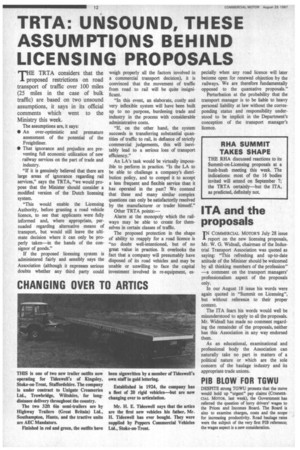TRTA: UNSOUND, THESE ASSUMPTIONS BEHIND LICENSING PROPOSALS
Page 14

If you've noticed an error in this article please click here to report it so we can fix it.
E TRTA considers that the proposed restrictions on road transport of traffic over 100 miles (25 miles in the case of bulk traffic) are based on two unsound assumptions, it says in its official comments which went to the Ministry this week.
The assumptions are, it says: • An over-optimistic and premature assessment of the potential of the Freightliner.
• That ignorance and prejudice are preventing full economic utilization of new railway services on the part of trade and industry.
"If it is genuinely believed that there are large areas of ignorance regarding rail services," says the TRTA, "we would propose that the Minister should consider a modified version of the Dutch licensing system.
"This would enable the Licensing Authority, before granting a road vehicle licence, to see that applicants were fully informed and, where appropriate, persuaded regarding alternative means of transport, but would still leave the ultimate decision where it can only be properly taken—in the hands of the consignor of goods."
If the proposed licensing system is administered fairly and sensibly says the Association (although it expresses serious doubts whether any third party could weigh properly all the factors involved in a commercial transport decision), it is convinced that the movement of traffic from road to rail will be quite insignificant.
"In this event, an elaborate, costly and very inflexible system will have been built up to no purpose, burdening trade and industry in the process with considerable administrative costs.
"If, on the other hand, the system succeeds in transferring substantial quantities of traffic to rail, in defiance of strictly commercial judgements, this will inevitably lead to a serious loss of transport efficiency."
An LA's task would be virtually impossible to perform in practice. "Is the LA to be able to challenge a company's distribution policy, and to compel it to accept a less frequent and flexible service than it has operated in the past? We contend that these and many similar complex questions can only be satisfactorily resolved by the manufacturer or trader himself."
Other TRTA points:—
Alarm at the monopoly which the railways may be able to create for themselves in certain classes of traffic.
The proposed protection in the shape of ability to reapply for a road licence is "no doubt well-intentioned, but of no great value in practice. It overlooks the fact that a company will presumably have disposed of its road vehicles and may be unable or unwilling to face the capital investment involved in re-equipment, es pecially when any road licence will later become open for renewed objection by the railways. We are therefore fundamentally opposed to the quantative proposals."
Perturbation at the probability that the transport manager is to be liable to heavy personal liability at law without the corresponding status and responsibility understood to be implicit in the Department's conception of the transport manager's licence.












































































































